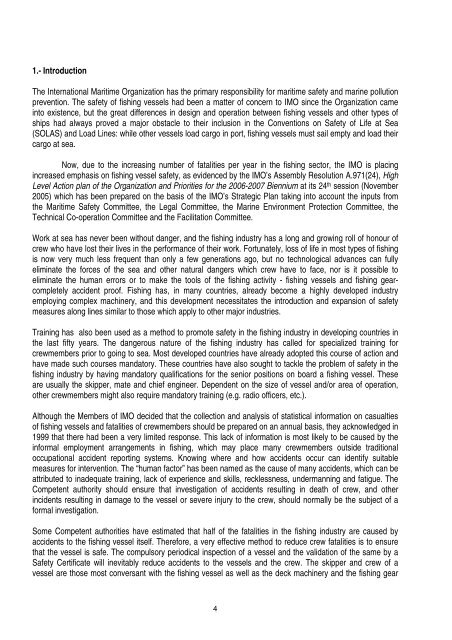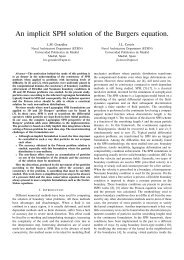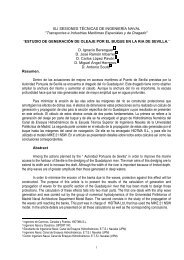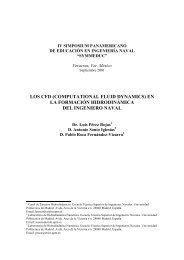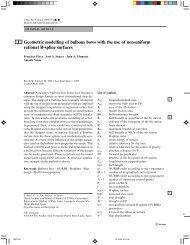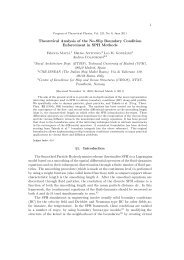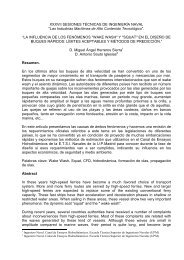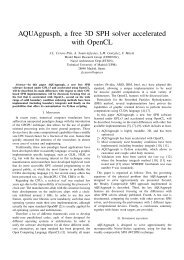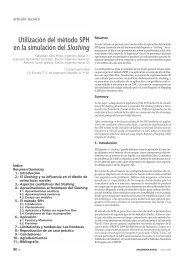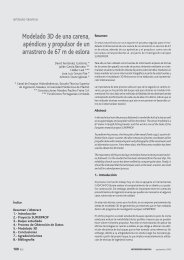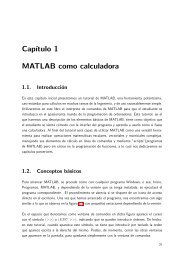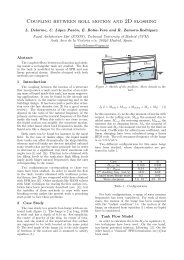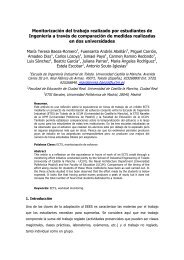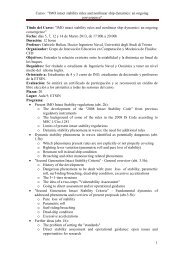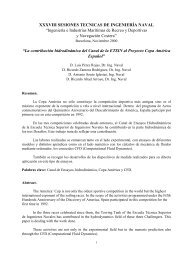imo and the safety of fishing vessels: past, present and future
imo and the safety of fishing vessels: past, present and future
imo and the safety of fishing vessels: past, present and future
You also want an ePaper? Increase the reach of your titles
YUMPU automatically turns print PDFs into web optimized ePapers that Google loves.
1.- Introduction<br />
The International Maritime Organization has <strong>the</strong> primary responsibility for maritime <strong>safety</strong> <strong>and</strong> marine pollution<br />
prevention. The <strong>safety</strong> <strong>of</strong> <strong>fishing</strong> <strong>vessels</strong> had been a matter <strong>of</strong> concern to IMO since <strong>the</strong> Organization came<br />
into existence, but <strong>the</strong> great differences in design <strong>and</strong> operation between <strong>fishing</strong> <strong>vessels</strong> <strong>and</strong> o<strong>the</strong>r types <strong>of</strong><br />
ships had always proved a major obstacle to <strong>the</strong>ir inclusion in <strong>the</strong> Conventions on Safety <strong>of</strong> Life at Sea<br />
(SOLAS) <strong>and</strong> Load Lines: while o<strong>the</strong>r <strong>vessels</strong> load cargo in port, <strong>fishing</strong> <strong>vessels</strong> must sail empty <strong>and</strong> load <strong>the</strong>ir<br />
cargo at sea.<br />
Now, due to <strong>the</strong> increasing number <strong>of</strong> fatalities per year in <strong>the</strong> <strong>fishing</strong> sector, <strong>the</strong> IMO is placing<br />
increased emphasis on <strong>fishing</strong> vessel <strong>safety</strong>, as evidenced by <strong>the</strong> IMO’s Assembly Resolution A.971(24), High<br />
Level Action plan <strong>of</strong> <strong>the</strong> Organization <strong>and</strong> Priorities for <strong>the</strong> 2006-2007 Biennium at its 24 th session (November<br />
2005) which has been prepared on <strong>the</strong> basis <strong>of</strong> <strong>the</strong> IMO’s Strategic Plan taking into account <strong>the</strong> inputs from<br />
<strong>the</strong> Maritime Safety Committee, <strong>the</strong> Legal Committee, <strong>the</strong> Marine Environment Protection Committee, <strong>the</strong><br />
Technical Co-operation Committee <strong>and</strong> <strong>the</strong> Facilitation Committee.<br />
Work at sea has never been without danger, <strong>and</strong> <strong>the</strong> <strong>fishing</strong> industry has a long <strong>and</strong> growing roll <strong>of</strong> honour <strong>of</strong><br />
crew who have lost <strong>the</strong>ir lives in <strong>the</strong> performance <strong>of</strong> <strong>the</strong>ir work. Fortunately, loss <strong>of</strong> life in most types <strong>of</strong> <strong>fishing</strong><br />
is now very much less frequent than only a few generations ago, but no technological advances can fully<br />
eliminate <strong>the</strong> forces <strong>of</strong> <strong>the</strong> sea <strong>and</strong> o<strong>the</strong>r natural dangers which crew have to face, nor is it possible to<br />
eliminate <strong>the</strong> human errors or to make <strong>the</strong> tools <strong>of</strong> <strong>the</strong> <strong>fishing</strong> activity - <strong>fishing</strong> <strong>vessels</strong> <strong>and</strong> <strong>fishing</strong> gearcompletely<br />
accident pro<strong>of</strong>. Fishing has, in many countries, already become a highly developed industry<br />
employing complex machinery, <strong>and</strong> this development necessitates <strong>the</strong> introduction <strong>and</strong> expansion <strong>of</strong> <strong>safety</strong><br />
measures along lines similar to those which apply to o<strong>the</strong>r major industries.<br />
Training has also been used as a method to promote <strong>safety</strong> in <strong>the</strong> <strong>fishing</strong> industry in developing countries in<br />
<strong>the</strong> last fifty years. The dangerous nature <strong>of</strong> <strong>the</strong> <strong>fishing</strong> industry has called for specialized training for<br />
crewmembers prior to going to sea. Most developed countries have already adopted this course <strong>of</strong> action <strong>and</strong><br />
have made such courses m<strong>and</strong>atory. These countries have also sought to tackle <strong>the</strong> problem <strong>of</strong> <strong>safety</strong> in <strong>the</strong><br />
<strong>fishing</strong> industry by having m<strong>and</strong>atory qualifications for <strong>the</strong> senior positions on board a <strong>fishing</strong> vessel. These<br />
are usually <strong>the</strong> skipper, mate <strong>and</strong> chief engineer. Dependent on <strong>the</strong> size <strong>of</strong> vessel <strong>and</strong>/or area <strong>of</strong> operation,<br />
o<strong>the</strong>r crewmembers might also require m<strong>and</strong>atory training (e.g. radio <strong>of</strong>ficers, etc.).<br />
Although <strong>the</strong> Members <strong>of</strong> IMO decided that <strong>the</strong> collection <strong>and</strong> analysis <strong>of</strong> statistical information on casualties<br />
<strong>of</strong> <strong>fishing</strong> <strong>vessels</strong> <strong>and</strong> fatalities <strong>of</strong> crewmembers should be prepared on an annual basis, <strong>the</strong>y acknowledged in<br />
1999 that <strong>the</strong>re had been a very limited response. This lack <strong>of</strong> information is most likely to be caused by <strong>the</strong><br />
informal employment arrangements in <strong>fishing</strong>, which may place many crewmembers outside traditional<br />
occupational accident reporting systems. Knowing where <strong>and</strong> how accidents occur can identify suitable<br />
measures for intervention. The “human factor” has been named as <strong>the</strong> cause <strong>of</strong> many accidents, which can be<br />
attributed to inadequate training, lack <strong>of</strong> experience <strong>and</strong> skills, recklessness, undermanning <strong>and</strong> fatigue. The<br />
Competent authority should ensure that investigation <strong>of</strong> accidents resulting in death <strong>of</strong> crew, <strong>and</strong> o<strong>the</strong>r<br />
incidents resulting in damage to <strong>the</strong> vessel or severe injury to <strong>the</strong> crew, should normally be <strong>the</strong> subject <strong>of</strong> a<br />
formal investigation.<br />
Some Competent authorities have estimated that half <strong>of</strong> <strong>the</strong> fatalities in <strong>the</strong> <strong>fishing</strong> industry are caused by<br />
accidents to <strong>the</strong> <strong>fishing</strong> vessel itself. Therefore, a very effective method to reduce crew fatalities is to ensure<br />
that <strong>the</strong> vessel is safe. The compulsory periodical inspection <strong>of</strong> a vessel <strong>and</strong> <strong>the</strong> validation <strong>of</strong> <strong>the</strong> same by a<br />
Safety Certificate will inevitably reduce accidents to <strong>the</strong> <strong>vessels</strong> <strong>and</strong> <strong>the</strong> crew. The skipper <strong>and</strong> crew <strong>of</strong> a<br />
vessel are those most conversant with <strong>the</strong> <strong>fishing</strong> vessel as well as <strong>the</strong> deck machinery <strong>and</strong> <strong>the</strong> <strong>fishing</strong> gear<br />
4


